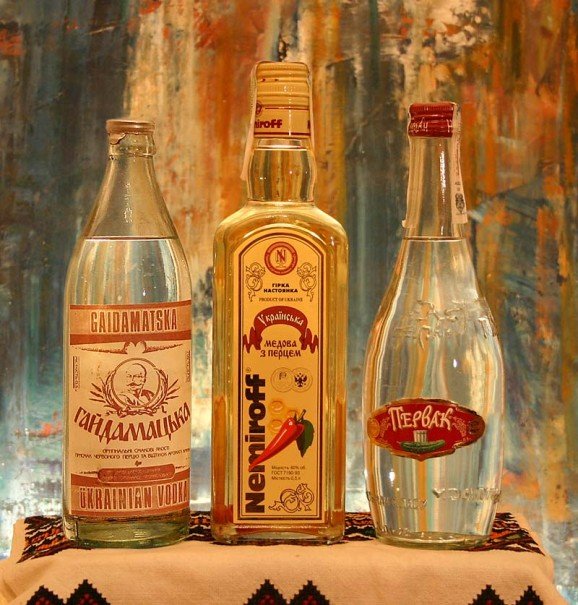
Learning to Toast with Horilka

Learning to Toast with Horilka
One of the results of Yanukovich’s election was that people in Kiev started getting arrested for drinking in the street. It was 2010, and Yanukovich had been newly crowned president, a big surprise after losing a contested election in 2005, one he had attempted to steal. Except his opponent Yuschenko’s Orange Revolution wasn’t all it was cracked up to be: the economy had not leapt forward, corruption was still rampant. Yanukovich was to bring order.
After buying a bottle of Georgian Saperavi (so called “Black Wine”), one I had not tried in Russia because of the ban following the 2008 war, we crawled to a courtyard in a Kruschev-era apartment block and passed it between playground swings. “I’m sorry to inconvenience you like this,” a goatee-d Danil said. “But ever since the new President, we can’t just walk down the street with a bottle.” Danil was from Novosibirsk, Russia and despite knowing no Ukrainian, he loved Kiev.
After the bottle, Danil dropped me at home. He had a date (someone from the “hot blooded South”, Crimea). I had found my hosts through a network of acquaintances in Russia. Little did I know, fashionable Dasha and Andrei had prepared a Zastolye, a party for us. The Zastolye means seemingly inexhaustible amounts of hearty food, portions that Harry Potter has at the Hogwarts mess-hall. Mayonnaise and beet salads, boiled potatoes and dill, cold cuts, meat, cucumbers.
“Have you tried horilka?” Dasha’s friend asked. Horilka is the Ukrainian word for vodka.
“I’ve tried vodka,” I said.
“Well then, you haven’t tried horilka!”
This is how I learned about toasts. Toasts, for the uninitiated, are long and drawn out, and go into personal stories, reminiscences, tirades and rants. Some parties have a toastmaster assign speakers, some just rotate around the table. Shots are always consumed to the bottom.
The first toast is always to meeting. The second is to nothing particular, served immediately after the first, saying, “Straight from first to second drink is better than to stop and think.” Then the third toast is always to love – later, for dreams to come true and then there is a proper order of toast subjects but after the fourth toast it’s difficult to keep track. To children! To teachers! To wives and girlfriends, that they shall never meet! Somewhere in there, though, is cooperation between nations, and an end to war.
We sang “I’m Going to Magadan” and a friend piped up, “You see, when you sing together with someone, you can never go to war with them. This is why we need to sing more often.”
I remember arguing for 55 minutes (I checked my watch) with a young woman about whether or not people were fundamentally good. We both felt from the outset they were good, yet somehow managed to argue for 55 minutes.
Turns out they were right. I had not tried horilka.
We ran out of horilka, went out for more.
Outside, Dasha’s friends tried to hug and kiss me and promised to visit me one day in New York. Then the police came. A neighbor had called in a noise disturbance. They politely asked us to step back inside. You had to admit, there seemed to be order. At the moment, we did not want it.
Knowing I would be hungover, the group tried to prevent it by forcing me to taste salo. Pure pig fat. Uncured bacon without the meaty section. They went to the freezer where apparently any Ukrainian family properly stores their salo, sliced off a chunk as best as drunk hands could on a frozen-solid piece of stringy fat, and then I committed the most unkosher act of my entire life. First I was fed more horilka. Then I swallowed the salo.
The next day, we went to the mall to help Dasha find shoes. I got lost on my way back, and I walked the length of the Maidan knowing from now on I would be intertwined with this place. Now that we had toasted together, whatever happened here would not seem so far away.